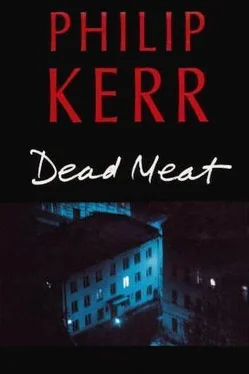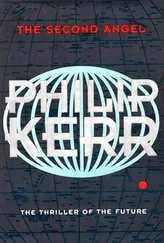Nikolai was examining a packet of Kosmos cigarettes.
‘Russian chalks,’ he said and lifted one of the filter ends clear of the foil wrapping. ‘And opened from the right end of the packet.’
Grushko unfolded Sultan’s wallet. He tossed a wad of dollars on to the carrier bag, then some food coupons, a condom, a railway warrant and a cutting from Novy Mir about Milyukin’s death. One thing seemed to interest him. It was a small piece of paper with an official-looking rubber-stamp on it.
‘Well, well, well,’ he said quietly.
‘What is it?’ I asked.
‘Sultan’s alibi,’ said Grushko. ‘I imagine this is what he wanted to talk to me about. It’s a release form, from the Petrogradsky Region Militia. According to this piece of paper, Sultan Khadziyev spent the night of Mikhail Milyukin’s murder drunk in the local LTP. That was why he felt so confident about meeting me. If this is genuine and he did spend that night in the drying-out tank, then he would have been in the clear.’
Grushko handed Nikolai the document.
‘You’d best check this out in the morning,’ he said. ‘Just to make sure.’
He sighed and stared up at the purpling sky. It would soon be dark, if only for about fifty minutes.
‘And that is that.’
‘So why buy him a ticket upstairs?’ said Nikolai.
‘The Georgians put two and two together and made five,’ said Grushko. ‘Just like we did.’ He shrugged. ‘Or that’s what they want us to think. Either way we’re back where we started.’
‘Still want us to pick the Georgians up tomorrow?’
Grushko looked at his watch. ‘You mean today, don’t you?’ he murmured wearily. ‘Yes, I do. More than ever.’
‘There is some good news, sir,’ announced Lieutenant Khodyrev.
‘Well, don’t make us beg for it,’ said Grushko.
‘We’ve found your burglar. One of my men picked him up this evening. At Autovo Market. He was trying to sell Mr Milyukin’s Golden Calf.’
‘Who is he?’
‘His name is Valentin Bogomolov,’ she replied. ‘He’s a juvenile offender, lives with his parents in the same building as Milyukin.’
Grushko nodded appreciatively at her. ‘Well done, Lieutenant,’ he said. ‘And Lieutenant?’
‘Sir?’
‘Sorry... sorry for biting your head off like that. It’s been a long day.’
‘That’s all right, sir.’
‘First thing in the morning, Nikolai, I want you and the lieutenant here to interview him.’
‘What about the Georgians, sir?’
‘You can leave them to Sasha and the OMON squad boys. I want to hear this little punk singing before lunchtime. Got that?’
‘Sir.’
By now Zverkov and his crew had succeeded in getting past the militia line. The cameraman was as close to Sultan’s dead body as his lens permitted. Zverkov stood beside him describing the scene into the microphone he was holding. There was a bright, intense sort of look on his face and he was grinning wildly, as if he was excited by what he saw. He reminded me of the small runaway boy, Rodya, who was still hovering near the scene. Once again Zverkov called out to Grushko and followed us as we walked back to the car.
‘Colonel Grushko? Can you tell us what happened here please? For St Petersburg Television.’ Zverkov covered the microphone. ‘Come on, Grushko. You’re not going to sulk about what happened the other night, are you? I was just doing my job. Same as now. Trying to find out what happened here. Was it a Mafia killing?’
Grushko stopped and looked at Zverkov with undisguised loathing. His lip wrinkled and for a second I thought he would punch the man. Instead he nodded towards the car and Sultan’s body.
‘Why don’t you ask him?’ he said.
The OMON squad was a special-purpose unit, a sort of militia-commando outfit. They wore military-style uniforms with helmets, blue flak jackets and carried machine pistols and AK47s. While awaiting the order to move they sat in a large room in the Big House and watched an Arnold Schwarzenegger video, their weapons cradled in their strong arms like schoolboys emulating their screen hero. The film, Predator , was in English, but only the action seemed to matter. Most of the squad’s members were in their twenties. Good-humoured and slightly nervous, they seemed more like a team of footballers trying to relax a little before a big match than a dedicated group of police gunmen. But there was nothing sporting about the way they tackled criminals and it was rare that anyone was inclined to offer these ruthless young men more than a token resistance.
Grushko put his head round the door and spoke to a man with a moustache who was smoking a cigarette and seemed less interested in the film than the others.
‘Pavel Pavlovich,’ he said, ‘a word, if you please.’
Lieutenant Pavel Pavlovich Khlobuyev, who was the unit’s commander, stubbed out his cigarette and followed Grushko into the corridor.
‘Have you got a Georgi Rodionov in your squad, Pavel?’ Grushko asked him.
‘Not any more. He took a bullet in the leg about a year ago. D’you remember? It was when we hit Kumarin and his gang.’
Grushko nodded vaguely.
‘Anyway, he was invalided out of OMON. He’s now a firearms instructor at the Police Training Centre in Pushkin. Best shot with a handgun I ever saw.’
‘Do you think he’s the sort who might handle a little private security work?’
Khlobuyev turned and looked back into the room. His men cheered as Arnie let rip with a heavy machine-gun.
‘Sir, half my squad is doing some kind of moonlighting.’ He shrugged. ‘It’s a fact of life, salaries being what they are. At 225 roubles a month I wouldn’t blame any of them if they were male models during their off-duty periods. The man you mentioned, Rodionov, do you know how much his compensation was when he got shot? Nothing. Nothing at all.’
‘Like I always say,’ said Grushko. ‘There’s nothing more expensive than a cheap police force.’
I met Grushko on the stair, under the watchful eye of Iron Felix.
‘Have you seen Pushkin yet?’ he asked.
I told him I hadn’t.
‘You Muscovites,’ he said, shaking his head with pity. ‘You’ve got nothing to compare with it. I’ll show you the Catherine Palace on the way to the Police Academy.’
He explained about Georgi Rodionov when we were in the car.
‘Does he know we’re coming?’
‘God, no,’ said Grushko. ‘It’ll be a nice surprise for him, eh?’ He chuckled sadistically.
Pushkin is about twenty-five kilometres south of St Petersburg and so named, since 1937, after the famous poet. For Stalin the best poets were always the ones who had been dead for a century. It was a quiet, leafy little place with some beautiful parks and not one but two royal palaces.
The Pushkin Police Academy stood only a short way east of the Catherine Palace and yet it would have been hard to have found two more contrasting buildings in the whole of Russia: the palace with its 300-metre-long facade of blue and white stucco, its gold cupolas and its gilded wrought-iron gates; and the crumbling brown brick of the Academy, with its potholed courtyard, its leaking roof and its peeling paintwork.
I was no Communist, but you didn’t have to be Lenin to see that a dynasty that could have built such palaces for themselves while peasants went hungry was headed for serious trouble. Yet I was glad that such places still existed: without these magnificent reminders of our former glories it would have been hard to see ourselves as anything but a third-world banana republic. With an acute shortage of bananas.
The Director of the Academy was a big ox of a man with a full, dark moustache you could have steered a motorcycle with. He had a friendly smile of the kind that is supposed to be lucky and, I was soon to suspect, a nose for making money that smelt in his Academy as many business opportunities as there were gaps between his teeth.
Читать дальше












